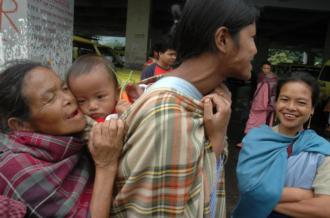
Khasi-Jaintia women believe men have enough of a role to play in society [Subhamoy Bhattacharjee/ Al Jazeera]
In the small hilly Indian state of Meghalaya, women call the shots!
Meghalaya - "Home of Clouds" - is picturesque state with its capital Shillong a regional hub for education and the trend-setter for the Westernised culture that's accepted by most tribes in the country's northeast.
The two major tribes of Meghalaya, Khasis and Jaintias, are matrilineal with a vengeance. According to BBC, a matrilineal system operates with property names and wealth passing from mother to daughter rather than father to son - but some men are campaigning for change.
Known as the "Khatduh", the youngest daughter anchors the family, looking after elderly parents, giving shelter and care to unmarried brothers and sisters, and watching over property.
Matrilineal doesn't mean matriarchal, so it's not a new form of patriarchy. It doesn't mean that women dominate men. Men are powerful too, but their power is somewhat inherited. There's just a new, unique balance between the sexes.

Khasi women with children in Shillong [Subhamoy Bhattacharjee/ Al Jazeera]
According to Khasi tradition, the youngest daughter inherits all ancestral property, men are expected to move into their wives' homes after marriage and children must take their mother's family name.
And, in a ruling that helps explain the grand welcome for female babies, all parents with ancestral property but no daughters are required to adopt a girl before they die, since they cannot leave the inheritance to their sons. (source)
The matrilineal system has endured for thousands of years, but now activists are determined to overthrow it. Mr Pariat is one of them. He's basically the chairman of Syngkhong Rympei Thymmai (SRT), a group fighting to eradicate a tradition with tremendous staying power.
Pariat is sick of housekeeping and even more so of being bossed around by his mother-in-law. He has put up with this situation since he was married.
"Can you imagine the shock of leaving your family home and suddenly becoming a dogsbody in your mother-in-law's house?" he asks. "She gives the orders and you become a good-for-nothing servant." (source)
"Nobody in the wife's house cares about her husband. He feels like an outsider. He can't return to his parental house because his sister won't care for him. He feels lost. So many Khasi men feel like an outcasts. They become desperate," Pariat told Firstpost, from Cherrapunji.
One crucial area exists, however, where women are not the dominant figures. The Dorbar Shnong - or the grassroots political institution of the tribes - debars women from holding office and remains a male-centric institution.
"Women would be represented at the Dorbar by male members of the family such as their husbands, brothers or uncles. These days women attend the Dorbar but cannot hold office as executive members, and certainly not as the headman," says Joshua Thomas, regional director of the Indian Council of Social Science Research.
The 60-member Meghalaya state assembly also has only four women lawmakers - an unusual situation in a society where social and economic powers rest with females.
"This is one reason why women in Meghalaya have been uncertain about entering electoral politics. There is an inherent feeling that politics is a male domain," says Patricia Mukhim, a national award-winning social activist who edits the Shillong Times newspaper. (source)
According to Travel With A Challenge, these are the basic differences between the stereotypical images of subservient Indian womanhood and the Khasis:
1) Both sexes are free to choose their own partners.
2) Often there is no formal marriage ceremony with the relationship merely sealed by the man moving into a woman's joint family ancestral home.
3) Divorce is equally simple: regardless of who initiates the split, the husband must move out of his wife's household-either back to his ancestral home, or to that of a new spouse. The wife may then introduce a new partner into her family enclave. Both are legitimate second marriages.
4) Giving birth to a girl is considered to be a special blessing.
5) Men have no custody rights over their offspring, and are not liable for alimony.

Khasi women selling fruit in Shillong [Subhamoy Bhattacharjee/ Al Jazeera]
Sociologists feel that tribal men do not work efficiently because they harbour an inferiority complex. Kyansai Warjri, who studied the parent-child relationship among the Khasis, found that boys get less affection, and are given second preference in education and clothing. Since parents motivate only the girls to do well, the men lack ambition. Says Warjri: "Boys are insecure as they grow up feeling unwanted. They cannot live like refugees in this modern age." (source)













COMMENTS